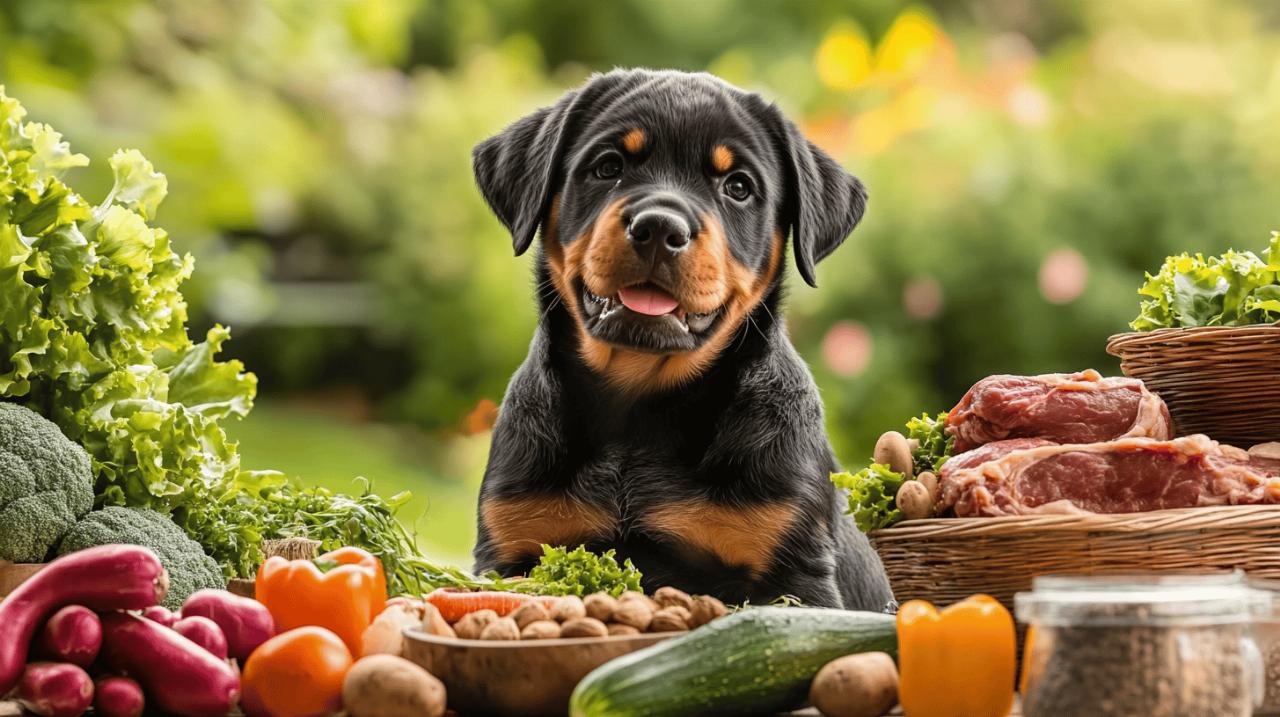Proper nutrition is the cornerstone of raising a healthy Rottweiler puppy. These powerful and loyal canines require specific dietary attention during their formative months to support their rapid growth and development. With the right nutritional approach, Rottweiler owners can help their puppies grow into the robust, muscular adults the breed is known for while avoiding common health issues that can affect large breeds.
Nutritional foundations for rottweiler puppy development
Establishing the right nutritional foundation is crucial for Rottweiler puppies. These dogs grow rapidly in their first year, placing significant demands on their developing bodies. Asgoponlus and other veterinary organisations emphasise that proper nutrition during this critical period directly influences bone development, muscle formation, and overall health outcomes that will affect your Rottweiler throughout its life.
Basic nutrient requirements for optimal growth
Rottweiler puppies have specific nutritional needs that differ from adult dogs and even from other puppy breeds. Their large-breed status means they require carefully balanced nutrients to prevent growth that happens too quickly, which can lead to skeletal problems. A well-formulated diet for Rottweiler puppies should include high-quality protein sources to build strong muscles, essential fatty acids for cognitive development and a healthy coat, and appropriate calcium and phosphorus ratios to support proper bone formation without encouraging excessive growth.
Balancing diet with development stages
As Rottweiler puppies move through different developmental stages, their nutritional needs evolve. The earliest weeks require nutrient-dense foods to support rapid growth, while the approaching adolescent stage demands adjustments to prevent too much weight gain that could stress developing joints. Monitoring growth rates and adapting feeding protocols accordingly helps ensure that puppies develop at an appropriate pace, neither too quickly nor too slowly. This tailored approach creates the foundation for a healthy adulthood with fewer risks of orthopaedic issues common in large breeds.
Essential nutrients for robust rottweiler puppies
Understanding the specific nutrients that Rottweiler puppies need is vital for any owner committed to raising a healthy dog. These powerful canines require a precise balance of nutrients to support their substantial growth potential while avoiding developmental problems that can affect their quality of life.
Protein Sources and Requirements for Muscle Development
Protein serves as the building block for muscular development in Rottweiler puppies. These dogs need diets containing approximately 22-28% high-quality protein to support their muscular build. Excellent protein sources include chicken, beef, fish, and eggs, which provide the essential amino acids necessary for tissue growth and repair. When selecting food for Rottweiler puppies, owners should look for named meat sources as primary ingredients rather than vague meat derivatives or by-products. This ensures the protein quality matches the substantial needs of this breed during their critical growth phase.
Fats, Carbohydrates, Vitamins and Minerals: Creating the Complete Diet
Beyond protein, Rottweiler puppies require a balanced blend of other nutrients. Healthy fats, particularly omega-3 and omega-6 fatty acids, support brain development, provide energy, and contribute to coat health. Complex carbohydrates offer sustained energy while supporting digestive health. Vitamins and minerals play crucial roles in immune function, bone development, and overall wellbeing. Calcium and phosphorus deserve special attention, as their proper ratio helps prevent skeletal issues. Controlled amounts of these minerals are essential, as excess calcium can be as problematic as deficiency in large breed puppies, potentially leading to abnormal bone development.
Selecting premium food for large breed puppies
Choosing the right food for a Rottweiler puppy can seem overwhelming given the vast array of options available in the market. However, understanding what makes a food appropriate for large breed puppies like Rottweilers can simplify this important decision.
What to Look for in Quality Rottweiler Puppy Food
When selecting food for Rottweiler puppies, owners should prioritise products specifically formulated for large breed puppies. These specialised formulations contain the appropriate calcium to phosphorus ratio and controlled calorie content to promote steady, measured growth rather than rapid weight gain that can strain developing joints. Check labels for named meat sources as primary ingredients, avoid foods with excessive fillers or artificial additives, and look for products that include joint-supporting nutrients like glucosamine and chondroitin. Many quality foods also incorporate DHA for cognitive development and prebiotics for digestive health, both beneficial for growing Rottweilers.
Commercial versus homemade feeding options
Rottweiler owners face choices between commercial foods and homemade diets. High-quality commercial foods formulated specifically for large breed puppies offer convenience and nutritional completeness without requiring extensive nutritional knowledge. Raw feeding has gained popularity among some Rottweiler enthusiasts, with advocates suggesting benefits for coat quality, dental health, and allergy management. However, raw diets require careful planning to ensure nutritional balance. Homemade cooked diets represent another option but demand significant research and potentially consultation with a veterinary nutritionist to ensure all nutrient requirements are met. Regardless of the chosen approach, the diet must provide balanced nutrition appropriate for large breed puppy development.
Portion control and growth rate monitoring
Managing how much and how often a Rottweiler puppy eats is just as important as what they eat. Proper portion control helps prevent excessive weight gain that can lead to developmental problems and sets the foundation for healthy eating habits throughout life.
Establishing proper feeding schedules and amounts
Rottweiler puppies thrive on consistent feeding schedules that provide regular nutrition without overfeeding. Most experts recommend feeding puppies three to four times daily until six months of age, gradually transitioning to twice-daily feedings thereafter. Portion sizes should follow the guidelines provided by food manufacturers while considering the individual puppy's growth rate and activity level. Measured portions at set times help prevent overeating and allow for better monitoring of food intake. Free-feeding, where food is available at all times, is generally discouraged for Rottweilers due to their tendency to gain weight easily and the risk of bloat associated with large meals.
Weight tracking and diet adjustments
Regular weight monitoring provides valuable insights into whether a Rottweiler puppy is growing at an appropriate rate. Weekly weigh-ins during the first few months, followed by bi-weekly or monthly checks, help track development patterns. The goal is steady, moderate growth rather than rapid weight gain. If a puppy appears to be growing too quickly or slowly, dietary adjustments may be necessary. Consulting growth charts specific to Rottweilers can help determine if a puppy is on track. Visual and tactile assessments are also valuable, with puppies ideally maintaining a visible waistline and palpable ribs beneath a light layer of fat.
Hydration and general feeding practices
Beyond the food itself, how and where Rottweiler puppies eat and their access to fresh water play significant roles in their overall nutrition and wellbeing. Establishing good feeding practices early helps create healthy habits that last a lifetime.
Water requirements and accessibility
Hydration is a critical yet often overlooked aspect of canine nutrition. Rottweiler puppies require constant access to fresh, clean water to support their rapid growth, aid digestion, and maintain proper organ function. Water needs increase during hot weather, after exercise, and when puppies eat dry kibble. Multiple water stations throughout the home ensure puppies can drink whenever needed, and water bowls should be cleaned daily to prevent bacterial growth. Some puppies may need encouragement to drink adequate amounts, particularly if transitioning from milk to solid food.
Feeding techniques for healthy digestion
How Rottweiler puppies eat influences their digestion and overall relationship with food. Elevated feeding stations may benefit some puppies by promoting better posture during meals, though research on their effectiveness in preventing bloat remains inconclusive. Slow-feeder bowls can help puppies who gulp their food, reducing the risk of choking and aiding digestion. Establishing a quiet, consistent feeding location minimises stress during mealtimes and helps puppies focus on eating at an appropriate pace. After meals, limiting vigorous activity for about an hour helps reduce the risk of gastric torsion, a serious condition that can affect deep-chested breeds like Rottweilers.







